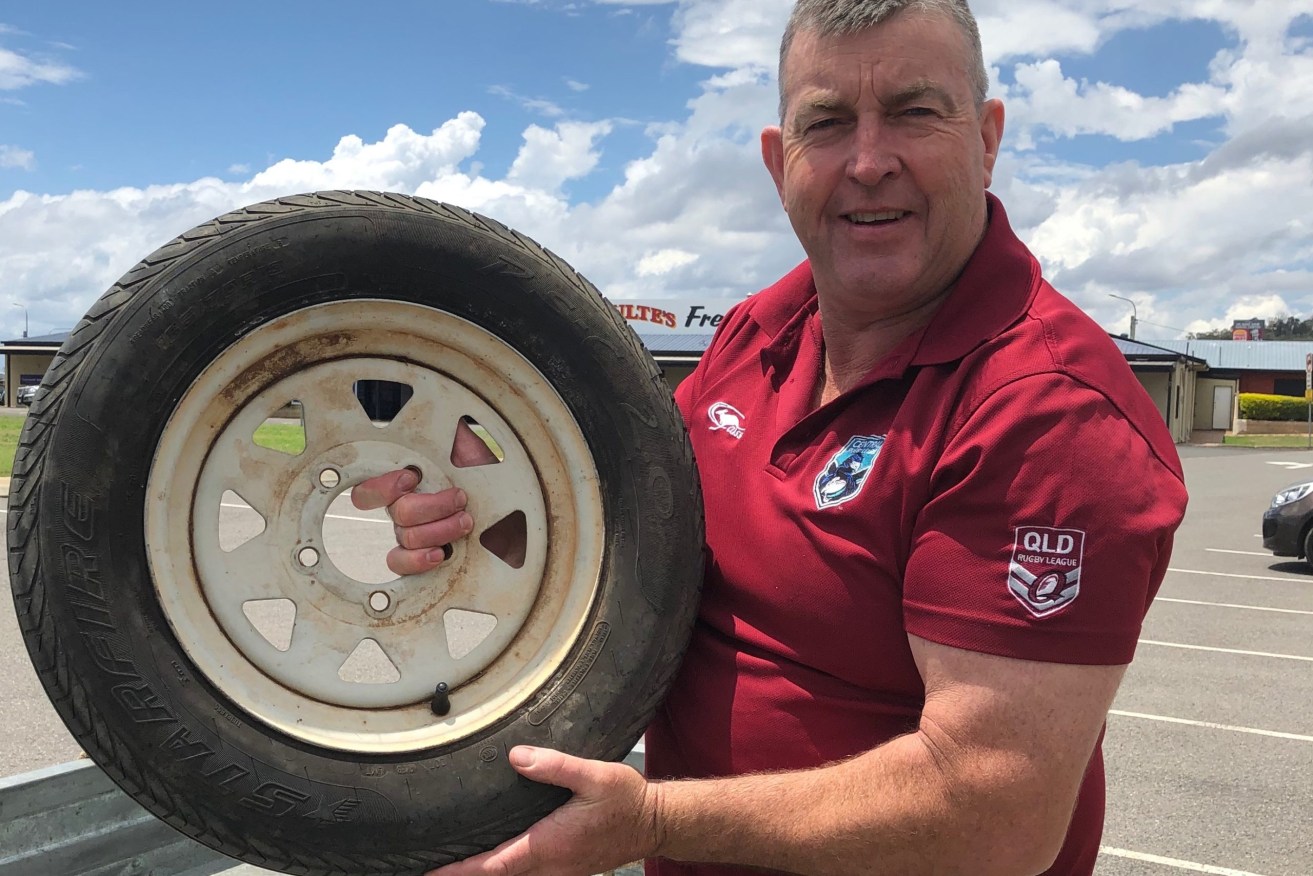Vicious circle: What to do with nation’s 56 million unwanted used tyres
Charleville is leading the call for a federal government fix on cleaning up toxic tyre dumps, just one of many environmental challenges confronting Queensland councils.


Murweh Mayor Shaun 'Zoro' Radnedge wants help so councils can clean up old tyres. (Photo: Supplied).
A staggering 56 million used tyres – equating to about 450,000 tonnes – are estimated to be sitting in disposal sites throughout Australia.
About 14 per cent is recycled into other forms, with 56 per cent exported and 30 per cent dumped illegally, stockpiled or ending up in landfills mostly owned and operated by local councils.
Now Murweh Shire Council, based around the western Queensland town of Charleville, wants to apply the brakes to the high environmental and financial costs of tyre disposal.
Led by first-time mayor Shaun Radnedge, better known as Zoro to his constituents, the council is asking the Local Government Association of Queensland to lobby the Federal Government to impose a levy on all tyres imported to or produced in Australia.
Contained in a motion put to LGAQ members at the association’s annual conference on the Gold Coast last week, the proposal is aimed at assisting all councils meet the cost of recycling or disposal of tyres under the State Government’s Waste Management Levy and Waste Reduction Targets.
Murweh Council has elevated the issue due to what it sees as mounting failures of the industry-led tyre product stewardship scheme implemented by Tyre Stewardship Australia.
“For some time now, it has not reduced the number of tyres being deposited in local landfills throughout the state with the cost of disposal or recycling being extremely prohibitive, especially in rural and remote shires,” Murweh’s motion read.
“This scheme has only led to additional revenues for tyre companies with no onus on them to dispose of or recycle tyres, with many of those tyres being dumped in council landfills for no cost, or if council charges, then disposed of in isolated locations around shires without penalty.
“Owing to the significant number of operators disposing of tyres it is hard to determine the illegal dumper and it’s left for council to then dispose of or recycle at a significant cost.”
Tyre Stewardship Australia (TSA) operates as a voluntary scheme under the National Product Stewardship Act and collects 25 cents per passenger tyre from member tyre importers.
From the revenue generated, TSA funds a range of projects to assist with key research to lead to greater diversion of disposed tyres away from landfill towards beneficial reuse, including as recycled content in roads and in advanced manufacturing.
Radnedge says that while progress is being made, it remains a significant challenge for regional and rural councils to fulfil these obligations when they lack key recycling infrastructure and reprocessing markets exist elsewhere.
He said funds created from the levy could be distributed to local governments to offset the costs of recycling of tyres or assist in the management of tyre disposal throughout council landfill facilities.
“This is a significant issue for local councils that places mandated responsibility on the supply and not at the disposal stage, which would provide much-needed revenue to assist councils responding to this difficult challenge,” he said.
Environmental challenges escalate
Queensland councils are taking the ‘think global, act local’ aphorism to a whole new level in their approach to environmental stewardship.
Environmentally conscious administrations from across regional and rural constituencies are demanding new ways of confronting issues that have the potential to adversely impact climate in the future.
Local government councillors and administrators met on the Gold Coast last week for the LGAQ conference, an event where, annually, members of the association lay out their legislative battle plans for the year ahead.
Despite shepherding their communities through a once-in-a-century pandemic and steering local economic recovery and resilience efforts, 2021’s advocacy blueprint comes tinged with a greener hue, with more than a third of the 93 motions presented by councils focused on better environmental performance and outcomes.
Out of these concerns, managing waste that is both environmentally responsible and fiscally prudent dominates the field.
Southern Downs Regional Council, based in Goondiwindi under the leadership of mayor Lawrence Springborg, wants a similar approach applied to the manufacturers of products such as refrigerant units, mattresses and solar panels.
Following the council’s successful motion, the LGAQ will lobby the State Government to fast track the implementation of a product stewardship program that would see the manufacturer take responsibility for disposal costs at the end of their product’s life.
According to the council’s motion, similar product stewardship programs have been established for agricultural and veterinary chemical containers, such as DrumMUSTER since 1998, and more recently the Container Refund Scheme.
“The implementation of such a scheme would support the principles of a circular economy and create employment opportunities,” the motion argued.
“The desired outcome is that national product stewardship schemes are implemented for various waste streams such as refrigerant units, mattresses and solar panels to ease the financial burden on local governments and manage the disposal of such items.
“Such initiatives would support the principles of a circular economy and align with the Queensland Government’s Waste Management and Resource Recovery Strategy.”
Solid support required
The LGAQ policy executive will be pressing the next State Government to recommit to advance payments that offset costs for disposing solid waste beyond June 2022.
In the 2019-20 financial year, Queensland councils received $143 million as advance payments to offset the impact of the waste levy on Queensland households.
The State Government has only given a three-year commitment for advance payments, which are due for review prior to June 2022 with no funding commitment beyond this date.
“Without the continuation of advance payments, these costs will be borne by Queensland households,” LGAQ’s motion read.
“Greater certainty, of at least the next term of government, is sought to provide ongoing financial sustainability.”












